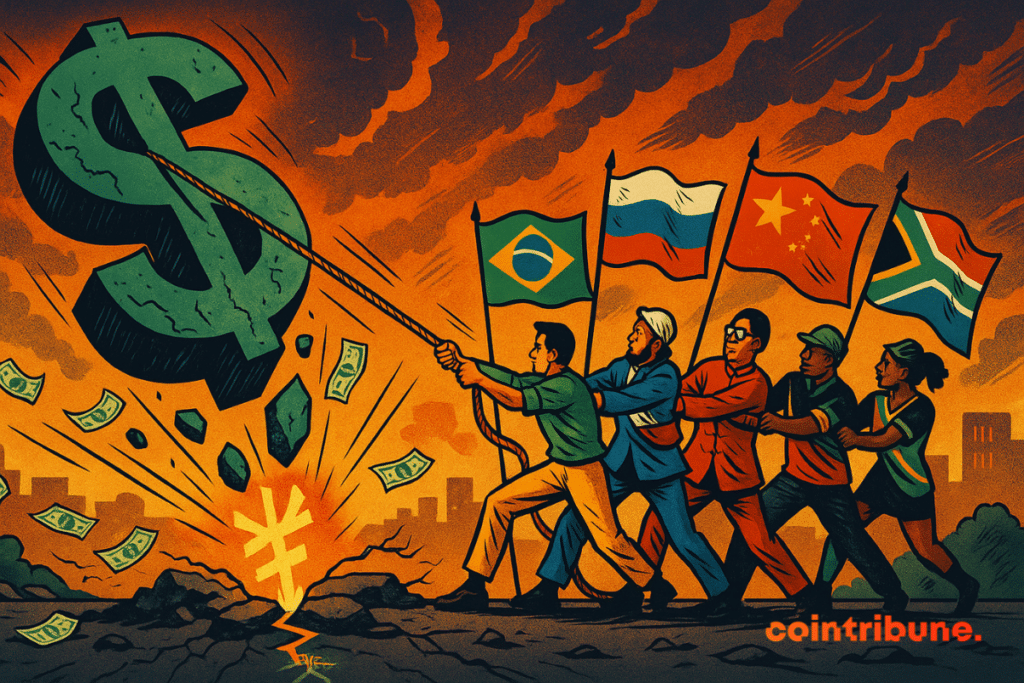13:00
5
min at reading ▪
While geopolitical rivalry is revived, dedollarization is again stored as a lever of monetary sovereignty. BRICS seemed to want to question the economic order dominated by Washington. However, the strategic relocation of Brazil, an influential member of the block, will shake this trajectory. By rejecting the idea of a common currency of the country, it renews cards of an already weakened project and revealed the limits of monetary coordination in the face of the reality of economic power relations.


In short
- The Block Brics goal is to reduce your dependence on the US dollar for several years through a ten -year -old dedollarization plan.
- Brazil, however the central actor of this initiative, sees his position today by saying that the dollar will remain dominant for a long time.
- According to Nilton David, director of Brazilian monetary policy, there is a “little chance” that this domination is changing to 2035.
- The dedollarization project is not abandoned, but it enters a more cautious, more progressive and uncertain phases in the face of geopolitical reality.
Realism prevails over monetary idealism
Brazil, although actively supporting the BRIC initiatives to reduce the dollar addiction, such as a survey of alternative payment systems and the progressive acceptance of blockchain technologies, was more cautious about the feasibility of the common currency.
In his statement, the director of the monetary policy in Brazil Nilton David interrupted the momentum of the British alliance and announced that no supply of assets denominated in the group currencies was now considerable to compete with the US dollar.
Really confirmed “There’s a little chance to change over the next decade”Speaking of the dominion of the US dollar.
A statement of heavy importance, especially from a country that in 2025 provides a rotating BRICS block.
In the light of this statement, several elements allow to understand the scope of this change of posture:
- Recognition of economic reality: Despite the statement of ambitions, no currencies or alternative system in the short -term or medium term is unable to effectively compete with the dollar place on international markets;
- Lack of internal cohesion within BRICS: very different approaches to members, in monetary policy and reserve administration, make it difficult to coordinate any collective initiative;
- The absence of multinational administration: unlike the European Union with the ECB, the BRICS does not have a common institution to pilot the possible only currency that complicates any cohesive strategy of dedollarization;
- Persistent structural dependence: Much of international exchanges, including those created among members of the block, remain marked in dollars. The transition would therefore be expensive, long and technically complex.
In short, it seems that Brazil confirms the truth that many economists have whispered months: the dollar hegemony cannot only be perverted by political will.
It disrupts its domination more than a common project and symbolic statements.
A global political context that redefines the priorities
This strategic inflection of Brazil interferes at least into a tense diplomatic context. Since the first 100 days of his second term of office, US President Donald Trump has indeed threatened BRICS with serious economic sanctions, especially through setting customs prices up to 150 %.
The aim of this ultra-viceness is to punish the initiative of the block on the marginalization of the dollar in international trade. Although these threats have not yet been introduced, it weighs strongly in the political and economic calculations of members of the BRICS block.
It seems that this change from your Brazilian side reflects the desire de -esaling in the face of the rise of business tension with Washington. The return of President Trump apparently cooled the hints of the anterior rupture.
Unlike Russia or China, Brazil remains economically dependent on the United States. This reality thus limits its space for the maneuver and could explain this realistic reading of the BRICS ambition. In other words, it may not be abandoning dedollarization, but a strategic deceleration motivated by the economic situation.
If Brazilian statements sound like a decline, dedollarization fails do not necessarily sign. This could mean the beginning of a more cautious, longer and more progressive phase where the dollar hegemony will be peripheral than direct confrontation. Although the BRICS SINGLE MONUCY project seems to be abandoned, the Alliance members will now have to deal with the opposite winds of unstable geopolitics and an offensive return of American units.
Maximize your Cointribne experience with our “Read to Earn” program! For each article you read, get points and approach exclusive rewards. Sign up immediately and start to accumulate benefits.
A graduate of the Toulouse and the Blockchain Consultant Certification certification holder and I joined the adventure of Cointribuna in 2019. I convinced of the potential of blockchain to transform many economy sectors, committing to raising awareness and informing the general public about how the ecosysty developed. My goal is to allow everyone to better understand blockchain and take the opportunity they offer. I try to provide an objective analysis of messages every day, decrypt trends on the market, hand over the latest technological innovations and introduce the economic and social issues of this revolution.
Renunciation
The words and opinions expressed in this article are involved only by their author and should not be considered investment counseling. Do your own research before any investment decision.

